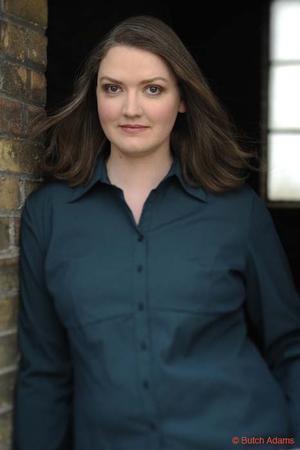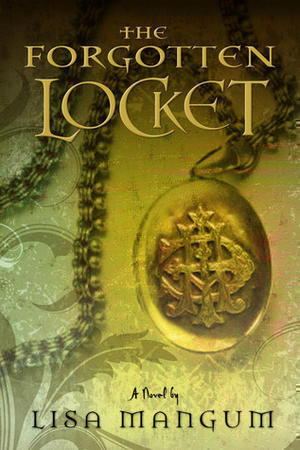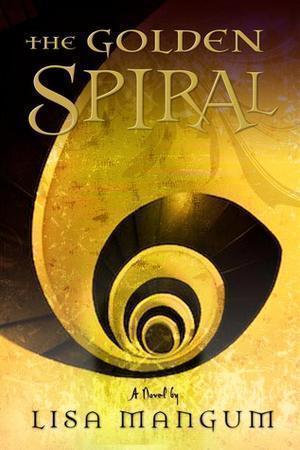 Lisa Mangum is the author of the Hourglass Door Trilogy. The final book in the series, “The Forgotten Locket” came out at the beginning of June. When she’s not writing, Lisa works as an editor for Deseret Book, a publishing company based out of Salt Lake City. The following is a mostly complete transcript of her interview with Cracking the Cover on June 8, 2011.
Lisa Mangum is the author of the Hourglass Door Trilogy. The final book in the series, “The Forgotten Locket” came out at the beginning of June. When she’s not writing, Lisa works as an editor for Deseret Book, a publishing company based out of Salt Lake City. The following is a mostly complete transcript of her interview with Cracking the Cover on June 8, 2011.
Now that you’ve finished the Hourglass Door Trilogy, how are you feeling?
Relieved and excited. Really, really happy. What I wasn’t expecting when I started the journey was that it would be so all consuming. Maybe that was naïve of me to think that it wouldn’t be like that, but all I’ve done for the last four years is think about this one story. From the readers’ perspective, they get to read the book and then they can read like 90 other books that year. For me, this was THE book that I spent all my time on, the story I thought about all the time. So I’m really excited to think about a new story and think about a new book and new characters.
As much as I love Abby and Dante and as much as I miss them, I kind of miss them coming to work with me and hang around and tell me their story, it’s kind of exciting to meet some new people and tell a new story.
I’m really proud of Book 3. It was the hardest of the three books to write, and so I feel really proud of myself having stepped up to the challenge to produce a book that I’m really proud of that and that so far the readers are really responding to positively, which makes me super happy.
What are you working on now?
I did need some down time. I was working on a very compressed schedule. I thought, “I’m going to take a little bit of time and catch up on my reality TV, something relaxing.” I have three new ideas and now I’m at the point where I get to pick which one I’m going to do first. They’re all three really exciting ideas. All three are clamoring for my attention, so it’s going to be a matter of which one grabs me and doesn’t let go.
My new ideas are still for young adult audience. Two are contemporary young adult … probably standalone. … The third idea is about fairies and even more in realm of paranormal, fantastical than the Hourglass Dour Trilogy. They’re at two ends of the spectrum. … Both ideas hold a lot of appeal. I want to grow as a writer and try new things, and I think either idea will give me a new playground to go to and play and develop some new talents for my writing.
 As your books have gained popularity has it become harder to juggle working with full-time job?
As your books have gained popularity has it become harder to juggle working with full-time job?
It’s always been hard to juggle a full-time job at Deseret Book and writing. Just because both endeavors take so much creative energy and thinking about words for both of them that it can be a little exhausting. I’ve noticed as I’ve published more books and they’ve grown in popularity and interest in them, it has been more difficult to juggle my time, mostly because now I’m doing more events and writing conferences and book signings and more promotion and marketing. I get more invitations to do fun, fabulous things for people that I didn’t when I was starting out my writing career.
I still put in a full day of work and full day of writing. … It adds an extra layer of complexity. It’s still a lot of fun being an editor, working with other authors. I’m not ready to give that part of it up. For now. I always tell aspiring authors don’t quit your day job because it’s nice to have a steady paycheck and have that experience, but I also don’t necessarily recommend your day job be an editor, because it adds an extra layer of complexity to an already complex profession of being a writer. But it’s still a lot of fun being an editor. I don’t want to give it up. Working with the other authors, reading the stories, helping polish them still fulfills me creatively and I’m not ready to give that part up.
Many of your fans are adults. Are you surprised by the crossover appeal?
It was what I secretly had hoped for when I was writing the book. I wrote it in mind for the young adult audience but I had hoped tit would be the kind of book that would expand the appeal to even younger readers and into adults. What I really wanted was to have a book that mothers and daughters could read together because that kind of experience was so important for me. When I was younger, I would read with my mom and we would read the same books together, or I would read to her, or she would recommend things to me. And I loved the ability to bond with my mom and be friends with my mom through the same books that we read. I secretly really wanted my book to provide that kind of bridge to mothers and daughters as well. So I’ve been extremely happy and gratified when I hear stories of that very thing happening. Of mom’s coming up and saying, “Please sign this for my daughter, but I’m going to read it first before I give it to her.” Or even teenagers who come and get the books signed for their mothers for Mother’s Day because they’ve both read the book and loved it. It’s been really an unexpectedly happy bonus for me.
Are you surprised by the overall success of the series?
I’m still so close to the material. It still doesn’t feel quite real that the book is finished and in bookstores and people are reading it. It hasn’t quite sunk in yet. … It still just makes me happy every time I think about it. I see the three little books on my bookshelf at home and I think, “Oh my goodness I wrote three books.” It makes me happy every time I see them.
 Your books are really unlike anything else out there. Was that a decision you made or was it easy because it was your own world?
Your books are really unlike anything else out there. Was that a decision you made or was it easy because it was your own world?
It was a little easy because it was my own world. When I set out to do the series, I did consciously think, “What can I do to make my book stand out and make it be just a little bit different?” I think it finds acceptance and a great home in the cannon of young adult literature because at the heart, it still is about a young adult girl trying to find her place in the world and find out who she wants to be and what kind of person she wants to be, which is a very dominant theme in all kinds of young adult literature. I think people resonate to that quite naturally, and then the details about time travel and maybe the Italian flavors and a few other things I put in the book, sort of help set it apart as something unique and different. For me, I was really happy to do that because it ended up being the kind of book that I would want to read. And that’s always the best sign for an author — that you’re working on a book that excites you as reader as much as it does as a writer. I think it’s almost the only way you can finish the manuscript done, if you’re excited about the book on day 360 as you were on day one working on the project.
A large part of “The Forgotten Locket” takes place in Italy. Have you ever been there?
I have not. I’ve always wanted to go. I’ll be honest, that was one of the dreams of Abby’s that I gave her that was from me, because I’ve always wanted to go. I’ve always loved the culture and the food, of course. I’ve never been. It’s on my to do list though: Go to Italy on vacation. So we’ll see. Maybe now that I’m all done I’ll celebrate the success by my husband and I going on a trip.
How did you capture the essence and flavor having never been there?
I did a lot of research, online. I knew from what I had studied in school and from other books that I had read that at the heart, Italy has always struck me as a romantic kind of dreaming place. So I was gambling on if I made it the kind of place I imagined it to be, it would be pretty close. … Whatever genre you’re writing, the world building becomes extra important and you almost have to treat it like a character. So I gave the Italian flavor, even though I had never been there, some personality, and I think that’s what helped carry it through.
When I spoke with you about “The Hourglass Door” a few years ago, you said, “The writing process was just a roller coaster and it was so much fun and I can just hardly wait to strap myself back in. … Maybe it’s just the first blush of my first book and I don’t know any better, but I don’t know that I would change anything.” Do you still feel the same?
 It’s gotten very different. I’ll be honest. I thought that the writing process I experienced for Book 1 would be the same process that I had for Book 2 and Book 3, and honestly I don’t think anything could be further from the truth. Everything I though I knew about my process for Book 1, I had to throw out the window and start over for Book 2, and I almost had to throw that out of the window and start over for Book 3.
It’s gotten very different. I’ll be honest. I thought that the writing process I experienced for Book 1 would be the same process that I had for Book 2 and Book 3, and honestly I don’t think anything could be further from the truth. Everything I though I knew about my process for Book 1, I had to throw out the window and start over for Book 2, and I almost had to throw that out of the window and start over for Book 3.
The best thing about the overall process of writing the trilogy was that it showed me what really at the core works for me as an author. It’s different for everybody, and I think that every author needs to figure out what that process is. For me, it turns out, I do better when I can outline obsessively, revise the outline obsessively and then write the book once and polish. That’s what I did for Book 3, eventually. Because I kept trying a lot of these other methods that were not getting me to where I needed to be until I fell back on what ended up being the best process for me, to outline and revise the outline — to see the whole shape of the book, the whole picture at the beginning. I had that for “The Hourglass Door.” I knew before I started “Hourglass Door” almost instinctively, I knew what the whole shape of that book was going to look like.
I think that’s one reason why the story just poured out, and it was just fast and fun and exciting. And for Book 2 and Book 3 I knew maybe 80 percent of the picture, 75 percent of the picture and it was a different ride. It was still a lot of fun and it still was a lot of exciting days, but there was a lot more effort that it took to fill in those blanks in the process.
Now I’m taking what I learned with Book 3 and applying it to where this new project is going to be, and I am outlining obsessively to make sure that before I start chapter 1, I know the whole shape of the book and I know where the edges are. That seems to give me the greatest confidence as a writer.
Looking back to the beginning of trilogy, how has your writing evolved?
I think I have improved as a writer. That’s what every writer hopes for, is to get better with every book. I think my pacing is little better. I think my plotting is a little better, a little tighter than it was before. I think I’ve improved with my descriptions and dialogue. I don’t think that there’s one area in particular where I made the greatest strides, but I feel that overall, I’ve made improvements in every arena. I think that’s good because I have all my tools in my toolkit, all my weapons were sharpened. I feel stronger for the next book, I feel like I’ve got the materials I need to do those new stories justice.
What do you hope readers get out of your books?
I hope that helps continue their fire, their passion for reading and books in general. I think that is one of the best things about books, is how much they make you love books and how much they make you love reading and even how much they make you want to start writing and telling your own story. I’ve heard that a lot from people, that reading my books has given them the courage or the desire to start writing something of their own, which makes me so extremely happy to hear that. So I would love for my readers to take that away, that passion to read more and writer more and make those stories that are inside of them come alive in some fashion. That would be great.
